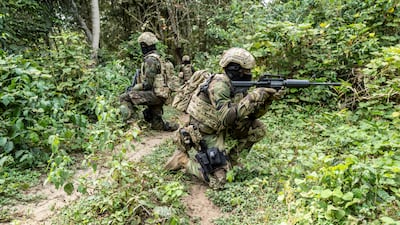Improving peace in the Middle East and North Africa may lead the region to rise in global rankings, potentially overtaking sub-Saharan Africa, South Asia and Russia in the next two to three years, experts have told The National.
The 2023 Global Peace Index, released on Wednesday, revealed Iceland as the world’s most peaceful country for the 15th consecutive year.
While the Mena region came last, dwindling conflict in certain countries may point to a slightly more optimistic future.
“Countries are realising the cost of conflict is just not worth it,” Steve Killilea, founder and executive chairman of the Institute for Economics and Peace, told The National ahead of the index release.
He added that he expected the Mena region to rise in the peace rankings and replace sub-Saharan Africa and other regions in the coming years, as terrorism gains a foothold in the Sahel.
"When we’re looking at the average regional score now, whereas the Middle East was way behind other regions, it’s fast approaching regions such as South Asia, Sub-Saharan Africa, and Russia and Eurasia."
"So, if improvements it's had in the last three years keep up, then in that case it will probably end up more peaceful than a couple of other regions. It’s not that far off a number of them now."
The Middle East recorded the biggest improvement in peacefulness in 2022 as well as improvement in regional ties, with the Iran-Saudi rapprochement and stable relations between Qatar and other Gulf states cited as signs of positive change.
Ongoing conflict also declined and was the primary reason for improvement, the report said.
Two countries – Libya and Oman – both came within the top five improvers this year, with the former raising its overall score by more than 7 per cent. Oman has no active conflict, but the index focuses on a wide range of factors that influence a country's stability – or lack thereof.
Qatar remains the most peaceful country in the region, a position it has held since the index began in 2008, and is the only Mena country in the top 25 globally.
Following the defeat of ISIS in Iraq and Syria, the global focus of terrorism has now shifted to areas of Africa, threatening to send its hopes for peace plummeting.
“Conflict and terrorism in the Middle East were key drivers of the global deterioration in peacefulness until 2015, but in the past eight years conflicts in other regions have underpinned the global decline in peacefulness,” the institute said.
The “epicentre” of terrorism has now shifted from Mena to sub-Saharan Africa, according to the institute, echoing widespread warnings of a rise in ISIS activity in Central Africa.
Mali and the Central African Republic were ranked the 11th and 12th least peaceful countries in this year's index, respectively.
Conflict between the Malian government and extremist groups led to the largest regional drop in peace, it said, blaming government failure to keep territory from falling into the hands of militants.
Globally, Afghanistan “bore the brunt” of terrorism in recent years, it added – a situation now changed as the Taliban is no longer classed as a terrorist group.
Israel declining sharply
Despite regional improvements, Israel declined sharply in 2022, dropping eight places on the global index.
Palestine was ranked higher overall than Israel, mainly due to Israel’s hostile relations with neighbouring countries, said Mr Killilea.
The biggest factor in Israel’s decline was political instability, including the proposed judicial reforms which led to record protests across the country.
But conflict with the Palestinians – which reached its deadliest yet in 2022 – was also a major contributor, alongside tension with Iran.
That conflict shows no sign of abating, with deadly raids continuing in the occupied West Bank and last week’s drone strike in Jenin – the first instance of its kind in the region since 2006.
Israel's commitment to expanding Israeli settlements in the West Bank is also likely to further diminish hopes for peace.
Drone use on the rise
The use of drones is also on the rise and expected to increase further in the near future.
The number of armed groups using drones has increased by 50 per cent in the past five years, with around 30 different groups using unmanned aerial vehicles globally, Mr Killilea said.
The number of drone strikes has "risen dramatically" in recent years, he added, at a rate of 200 to 300 per cent.
"Drones are just a small part of what’s used in conflicts but we are seeing it increase quite strongly," he said, adding that "we will see more use particularly as drones become able to fly further".
Wednesday's report noted Turkey's role in particular, with Ankara described as a "drone superpower" for its exports – primarily destined for Ethiopia, according to Mr Killilea.


